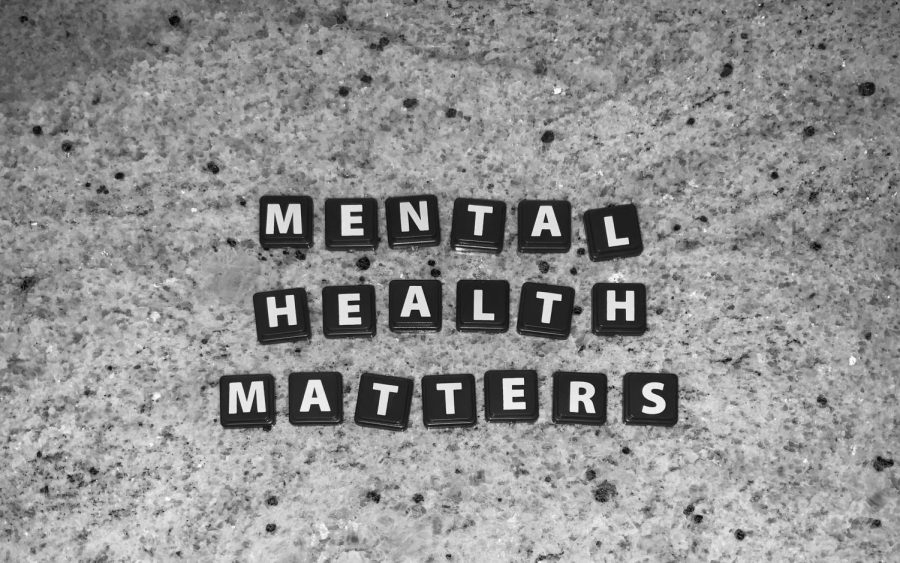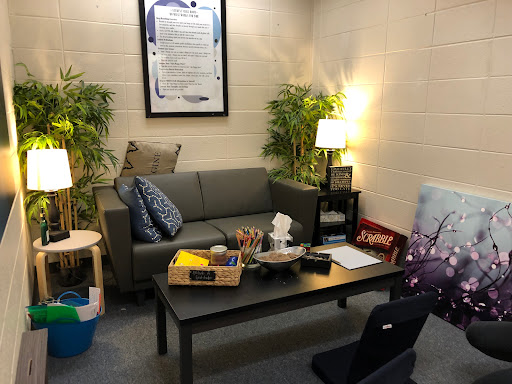Chatting with Counselors: COVID 19’s Impact on Students’ Wellbeing and Mental Health
Used from Unsplash with permission from Marcel Strauss
Mental health matters. Many individuals tend to dismiss the importance of maintaining their mental health because they do not consider it a “real” health condition. In reality, many students have experienced many of the effects of negative mental health practices without receiving the proper support and help they need.
October 25, 2021
As students and staff are settling down in the school year, many individuals are still adjusting from the transition of virtual to in-person school.
With over a year of solitude and other hardships during that time –all whilst balancing schools and extracurriculars– some students may have trouble coping. The pandemic has impacted everyone in a variety of areas such as in their educational setting, home life, and especially, their mental health.
While the pandemic continues and the school year works to accommodate these unforeseen circumstances, South Forsyth High School is making it a focus to support its students’ mental health inside and outside of school.
The number of young adults affected by mental health problems has skyrocketed over the past year, and ages 11-17 are said to have had the greatest reported cases of either anxiety or depression post-pandemic. Furthermore, the cases of youth depression and mental health problems for all ages are extremely prevalent in Georgia. In fact, Georgia is the second-highest for youth with substance use disorder and sixth for teens with one or more major depressive episodes (MDE), which can be due to certain mental health conditions such as anxiety. Precisely, the mental health data for South Forsyth High School in 2020 can be found here.
The following survey results in the slideshow are from the 2020 Georgia Student Health Survey, and all data is anonymous and self-reported. The questions shown below in the slideshow were compiled from 9th to 12th-grade students at South Forsyth High School. Specifically, the graphs showcased some important statistics relating to mental health as they further the importance of taking care of one’s mental health.
Mental Health Piece by Shree Delwadia
The current figures and information relating to this topic are extremely concerning; in order to gain a deeper perspective on the field of mental health and COVID-19’s effect on the subject, South counselors, Ms. Shari Frankel and Ms. Tonia Campobenedetto discussed certain techniques to help students prioritize their mental health as well as how to cope with the struggles of transitioning to in-person.
The counselors mentioned one of the most pressing mental health issues amongst the student population: generalized anxiety. The emotion of anxiety is packed with feelings of tension or worrisome thoughts that can lead to negative physical changes such as increased breathing and heart rate.
Ms. Campobenedetto elaborates, “I think [the anxiety is in] students, parents, families, and society as a whole. Everybody’s just anxious.”
Anxiety is not just present in one age group, and anxiety disorders are the most common form of mental illness, affecting millions of young individuals all over the world. In fact, approximately 40 million people in the country experience some form of anxiety disorder each year.
“The pandemic has elevated anxiety all around, sprouting from the [fear of the] unknown and the stress that it has caused amongst the society as a whole,” said Ms. Campobenedetto. “I think it trickles down into the school building, and students bring those stressors to school with them, and anxiety is the result of that.”
The level of anxiety present within the student population is disadvantageous to their state of mind. It’s important that students address these feelings rather than allowing them to build up in order to strengthen their mental and overall health.
Ms. Frankel introduced the idea of mindfulness. Mindfulness allows students to focus on what is happening at the moment. In other words, it’s all about living in the present. With this, individuals are able to be fully aware of their actions and surroundings, rather than worrying about what might happen in the next few hours or dwelling over something that occurred in the past. Oftentimes, students are worrying about a bad test that they just took or an upcoming assignment deadline. While these emotions are valid, sometimes these emotions may become counterproductive, both physically and mentally, if not properly handled. Therefore, mindfulness enables students to drift away from chances of overthinking and anxiety because it allows them to focus on elements in the present.
Ms. Frankel comments, “we have mindfulness things people can do to gain confidence within their brain and learn.”
Breathing practices that work to decrease stress and negative emotions within the body are a great way to exercise mindfulness, as they aim to concentrate attention on the current moment. Other common practices include meditation, yoga, relaxation and personal reflections throughout the day.
“Mindfulness is a great way to counter all the information that is coming at us all the time, especially through social media where you might see what your friends are doing or might have multiple news stories and advertisements coming at you,” Ms. Campobenedetto added.
“It is helpful to be able to turn that [the media] off, silence it, and step away in order to do some mindfulness techniques that bring yourself back [to the present]. You start to experience symptoms of anxiety and you can’t really put your finger on what caused it. However, by choosing some of those exercises to take control of your mind and thoughts, it’s like being able to take a pause,” she said.
Ms. Frankel compared mindfulness to caring for a baby, adding: “When you are infants, if a baby is left to cry, they continue crying until eventually, they can’t breathe anymore. As an adult, we grab the crying baby and swaddle them with a blanket. That is what mindfulness is for your brain. You take control; you are the parent that is swaddling the ‘baby’ inside your head [your brain] instead of everything else that is coming at you.”
However, despite mindfulness, many students continue to experience so much anxiety and stress to the point that it is truly taking a tremendous toll on their mental health. Regardless of the cause of these situations, it’s important to be thoughtful of these feelings and work to overcome the issues that are causing them. Both virtual and in-person students continue to experience these negative emotions that affect their everyday life. For previously virtual students, the pandemic has transformed their perspective of school, making it difficult to adjust to the in-person school setting and become more comfortable with this daily school routine.
In order to address this transition, SFHS has created a “chill room” inspired by Georgia State University. All students are able to come to the counseling office, and from there, they can be taken to this room for twenty minutes to help achieve the idea of mindfulness. There are a variety of activities inside the room such as kinetic sand, Rubik’s cubes, coloring books and other items that will be beneficial for students to just take a moment for themselves.
“We found it [the chill room] to be extremely helpful for students to be able to ground themselves and come back [to the present] if everything is overwhelming for them in the building,” mentioned Ms. Frankel.
In order to further address the mental health concerns arising over the student body after the start of the pandemic, the Forsyth County school system has created a resilience and wellness toolkit assisting both families to cope with the changes. This toolkit contains information about addressing current emotions, supporting an individual’s health triangle, working to gain personal satisfaction in life, and more. It is a supportive community resource that highlights the fact that school is not simply about earning a good grade, but rather about supporting your personal and emotional endeavors along the journey as well.
In the end, Ms.Frankel mentioned an important last piece of advice to help alleviate stress.
“Live like you are in kindergarten. When you were in kindergarten, you were amongst friends and would start to talk to people. You did not overly think about things. You continuously made friends, you reached out to play with others. When you get to high school, for many situations you are like, ‘Oh my gosh, what is this person going to think of that?’ When you live like you are in kindergarten, you are going to make more friends. You are going to be more relatable, more friendly, and more open to receiving friendships.”
Ultimately, a wide variety of resources are available to support students and their mental health, and after the unforeseen changes in many students’ schooling, it’s essential for them to take the first step towards addressing their mental health. These resources highlight how important it is to reflect and focus on your current emotions and thoughts whether that be through mindfulness or the other techniques available.
Yes, mental health conditions make the switch to in-person schooling that much more difficult, but with the tremendous help from the county and staff, students will be able to strive through the shifts of this rocky global pandemic.






